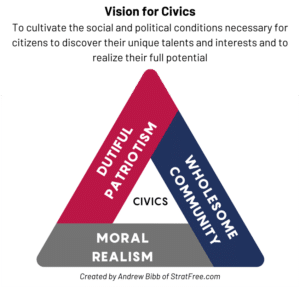For many, the term “civics” conjures images of musty social studies classes, School House Rock cartoons, and lectures on American history whose characters sometimes seem as remote from the issues of our day as the moon. The need for civics is obvious to those with a natural concern for social and political issues, but for many others it holds little appeal.
If the mere recitation of facts about our form of government is the extent of our civic education, it’s no wonder most find civics uninteresting. This approach shows a lack of vision or, at best, a poor one. A vision statement for civics along these lines is something like, “To ensure citizens know some facts about the US government.” This is a poor vision statement indeed.
Strategists know that if your vision doesn’t excite you then the slightest hardship or inconvenience is enough to derail the entire endeavor. The vision is supposed to elicit buy-in and ownership from all involved, and if stakeholders can’t see its relevance to them then that task becomes virtually impossible.
Fortunately, civics doesn’t have to be boring, dry, or irrelevant. The right to the “pursuit of Happiness” in the Declaration of Independence and the US Constitution’s “Blessings of Liberty” amount to one thing: the freedom and opportunity to pursue a meaningful life.
Simply put, civics is the preservation of that freedom and the promotion of those opportunities. It means cultivating the social and political conditions necessary for citizens to discover their unique talents and interests and to realize their full potential. It doesn’t get more exciting than that!
To achieve the vision of a social and political environment where meaningful living is the norm, I propose that our society must master three core competencies:
- Dutiful Patriotism. Patriotism that is unthinking and reactionary does more harm than good for achieving our strategic vision, but patriotism that is thoughtful, informed, and conscientious is indispensable for preserving the conditions that foster freedom and meaningful living.
- Moral Realism. Meaningful living requires us to understand and pursue what is objectively good. While there is plenty of room for respectful disagreement about exactly what that looks like, our strategic vision for civics requires us to trust that those disagreements arise not out of malice, but an honest desire to find solutions to problems that benefit all concerned.
- Wholesome Community. Meaningful living is impossible in a vacuum. It requires healthy and life-giving relationships in our families and communities. Strategy is all about bringing a worthy and transcendent purpose into the tangible here and now, and community is where the benefits of civics are at their most tangible.
No society is perfect, but one whose common vision is the freedom to pursue a meaningful life and that resolutely cultivates these three core competencies can’t help but become a society worth being a member of.
Andrew Bibb is a military strategist and a recent graduate of LBL’s Mastering Strategy bootcamp hosted by the Army Strategist Association. The views expressed are those of the author and do not necessarily reflect the official policy or position of any entity of the U.S. government.
